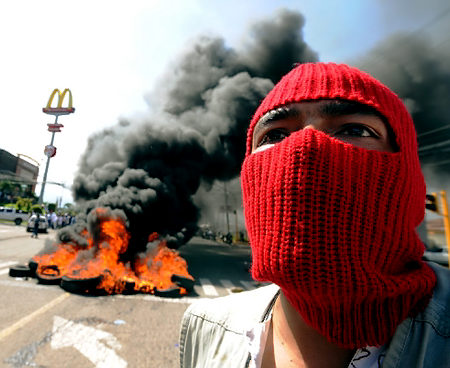
|
Honduras Coup – Mining Companies Regain Lost Concessions CPS
– Regina Branch
A different picture was presented to a Regina audience February 9, by Jeffery Webber, who teaches politics at the University of Regina, and who was in Tegucigalpa in January on behalf of Rights Action, a group active in building North-South solidarity. Webber explained that Zelaya was a businessman and a member of the Liberal Party, which had alternated in power since a military junta stepped down in 1982. Zelaya took office as president in 2006, defeating Porfiro Lobo, and surprised many with a left turn. He rejected calls to privatize the country’s electricity and water systems, moved to expropriate and redistribute unused farmland to landless farmers, raised the minimum wage for workers by 60 percent, introduced free school enrolment, cancelled gold mining concessions to foreign companies which had not implemented environmental studies, replaced oil imports from U.S. companies with cheaper imports from Venezuela, and proposed converting a U.S. military airbase to civilian use. With these moves Zelaya won the support of the workers of Honduras, the third poorest country in South America. The final straw, as far as the tiny privileged Honduran elite was concerned, was Zelaya’s efforts, supported by the social movements, to initiate constitutional reform. He tried to hold a non-binding vote on whether or not to have a constitutional assembly called. This was seized on by the elite and presented as a power grab by Zelaya, a charge which was repeated unquestioningly by the North American mainstream press. In June last year Zelaya was seized in a military coup and flown to Costa Rica, and Roberto Micheletti, a member of the right-wing faction of the Liberal Party, was installed as president. The coup was condemned by the United Nations and the O.A.S., and initially by President Obama, who shortly switched sides and recognized the coup government. In September Zelaya returned to Honduras and was sequestered in the Brazilian embassy. According to the Committee of Family Members of the Disappeared of Honduras (COFADEH), following the coup a reign of terror was instituted and carried on. The November election itself was boycotted by the anti-coup resistance movement, and no candidate ran who opposed the coup. The results have not been recognized by most Latin American governments. According to the Honduran government, the turnout was 60%, but resistance leaders place it at closer to 30%. However, the government is now recognized by the U.S. and Canadian governments as ‘democratically elected,’ and it’s business as usual for North American corporations in Honduras. Webber pointed out that Honduras is an important destination for sweatshop manufacturing and tourism capital, and that all the current mining exploration concessions in Honduras are owned by Canadian companies. On January 27 the new president, Profirio Lobo, was sworn in and one of his first actions was to reconfirm the mining concessions. As Lobo took office, Zelaya was again flown to exile, this time in Costa Rica. At the same time, hundreds of thousands of Hondurans marched through the streets of the Tegucigalpa, the capital city, in protest, honouring Zelaya, and promising in the end to defeat Lobo and the coupists. Another speaker giving a picture of the Honduran coup and its aftermath, a picture different from that presented by the mainstream press, is Jose Luis Baquedano, secretary treasurer of the Honduran Labor Federation CUTH, which claims 250,000 members and is the smallest of three Honduran labour federations. Bequedano spoke in the U.S. in January as part of a West Coast tour organized by the San Francisco Central Labor Council and Portland’s Cross-Border Labor Organizing Committee. The tour’s purpose was to tell what really happened in Honduras. Baquedano painted the same picture as Webber, giving the same details of events leading up to the coup. In the days after the coup, Honduran labour unions took part in a general strike to demand Zelaya’s return to office. The strike took the form of refusing to work two days a week, but ended after several weeks as some workers were fired and soldiers repeatedly opened fire on street marches. Some 40 to 50 activists were killed. Bequedano said more than half of Hondurans had boycotted the November election as illegitimate. He asked for a boycott of Honduran products if the coup government remains in power, but for the present, asked that American union members call on the Obama administration to rescind diplomatic recognition. Peter Kent, Canada’s Minister of State for Foreign Affairs in the Americas, was one of those actively whitewashing the role of those carrying out the coup, not surprising in view of the interest of Canadian mining companies in that country. It behooves Canadian unions to take up this fight by Honduran workers against the perpetrators of the coup. |

 The
last week in January the coup-installed government of Honduras put the ousted
president of the country, Manuel Zelaya, on a plane, bound for exile in the
Dominican Republic; the six generals who had carried out the coup the previous
June, were pardoned by the Honduran Supreme Court; and a new president, Porfirio
Lobo, ‘democratically elected’ last November, was installed. As the Globe and
Mail reported January 27, "The country’s institutions moved quickly this week to
put the coup behind."
The
last week in January the coup-installed government of Honduras put the ousted
president of the country, Manuel Zelaya, on a plane, bound for exile in the
Dominican Republic; the six generals who had carried out the coup the previous
June, were pardoned by the Honduran Supreme Court; and a new president, Porfirio
Lobo, ‘democratically elected’ last November, was installed. As the Globe and
Mail reported January 27, "The country’s institutions moved quickly this week to
put the coup behind."